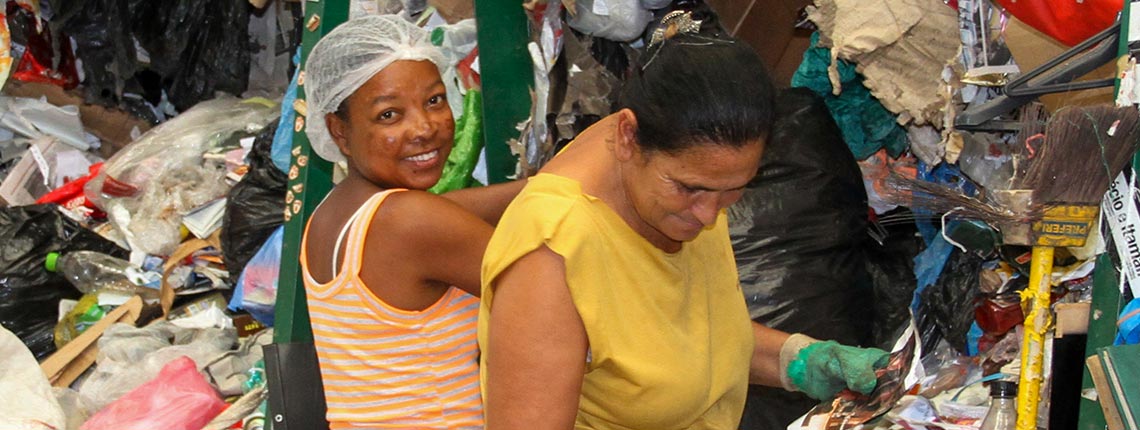Workers in informal employment experience frequent workplace exposure to a range of occupational health and safety risks. They are often forced to bear full responsibility for addressing these risks in their workplaces, even though they commonly lack access to health care and face profound income insecurity. The climate crisis poses an additional, existential threat to workers – with catastrophic impacts on workers’ health and livelihoods.
Despite being agents of environmental sustainability, for example by reducing greenhouse gases through inclusive recycling, workers are becoming increasingly vulnerable to climate and health risks. Extreme heat forces street vendors to work in the burning sun without shade and home-based workers to work indoors without adequate ventilation and air conditioning. Due to water scarcity, domestic workers have to travel further from their employers’ homes to seek water, and waste pickers face the dangers of floods at their landfills.
WIEGO has been supporting a project by the International Institute for Environment and Development (IIED) – seeking to interrogate the risks faced by workers in Zimbabwe and India due to the changing climate – and co-produced with them a range of inclusive strategies to address these risks. The project was funded by the National Institute for Health Research (NIHR), Global Health Research Group with a UK government grant.
A part of the co-production process was to foster the exchange of knowledge and experiences among workers within the WIEGO network, during which worker organizations, cooperatives and activists from Zimbabwe, Brazil, South Africa, Bangladesh and Ghana shared climate change-driven occupational health and safety issues that they face. This led to a stimulating virtual discussion, facilitated by WIEGO. In Zimbabwe, workers connected heat stress and reduced water access to impacts on worker presenteeism and incomes, highlighting the ways in which these impacts are more acute for women workers (who are usually tasked with fetching water for their households). The Zimbabwe Chamber of Informal Economy Associations – a membership-based organization of WIEGO and a key partner in the IIED project – recently had some success advocating at municipal level when they signed a Memorandum of Understanding with the Masvingo City Council to provide workers with toilets and infrastructure, promote green jobs and support workers’ local reforestation efforts.
In Brazil and Ghana, the importance of worker cooperatives for organizing for environmental and health justice was emphasized. Especially the Gender and Waste project in Belo Horizonte, Brazil, which was highlighted for its focus on the struggles of women waste pickers. Colleagues from South Africa and Bangladesh drew attention to workers being displaced and made homeless as a result of extreme weather events, as well as to their organizations’ crucial work in innovating environmentally-friendly, zero-waste working practices and promoting democratized responses to the climate crisis that raise workers’ voices in national and global policy spaces.
Suggested strategies for the short- and long-term largely revolve around raising awareness. There is an urgent need for further exploratory (and participatory) research on the impact of the climate crisis on the health and livelihoods of workers that puts workers’ stories at the centre, and for extensive documentation and sharing of good practices around managing climate and health risks in the workplace. The latter would play a key role in building cross-border solidarity networks of worker organizations mobilizing on this issue. Worker organizations must also benefit from capacity building on climate and health risks, to be better equipped to engage with policy debates and to lead on developing innovative solutions.
Aside from these suggestions, workers need system-wide protections – with states and those who possess capital taking responsibility for climate and health risks. This includes the provision of universal health coverage models that are truly universal and offer comprehensive primary health care: health care that is affordable, available to all, appropriate and of good quality. Without this, workers around the world remain highly vulnerable to the risks posed by the climate crisis.
